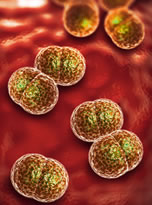Read and report vaccine reactions, harassment and failures.
Can Meningococcal Disease be prevented and are there treatment options?

Meningococcal disease can be prevented by refraining from travel to areas where outbreaks are occurring and by avoiding overcrowded areas. Because smoking and second-hand smoke exposure have also been found to increase the risk of meningococcal disease, smoking cessation and limiting exposure to secondhand smoke may reduce meningococcal disease risk.
Good hygiene practices can help prevent the spread of the disease. Not sharing utensils, drinking glasses, food, towels, toothbrushes, and lipstick are effective ways to prevent transmission of the disease.
Prophylactic antibiotics such as rifampin, ciprofloxacin, ceftriaxone, or penicillin can be used to prevent the spread of meningococcal disease among family members or close contacts of a person diagnosed with meningococcal disease.
Invasive meningococcal disease is treated with antibiotics, and currently cephalosporins such as ceftriaxone and cefotaxime, are considered to be most effective against the disease. Blood and/or cerebral spinal fluid (CSF) is collected and tested to determine the presence of infection. These samples are also cultured to determine what specific bacteria are present so the most appropriate antibiotic can be selected to treat the disease.
Antibiotic-resistant serogroup Y meningococcal strains have emerged and in 2020, of the 41 isolates of meningococcal serogroup Y available to the CDC for analysis, 8 were found to be resistant to ciprofloxacin and penicillin, and 13 were found to be resistant to penicillin only. Additionally, two cases of penicillin-resistant were found in non-US residents who sought care in the US.
NVIC “Quick Facts” is not a substitute for becoming fully informed about Meningococcal disease, meningitis and the Meningococcal vaccine. NVIC recommends consumers read the more complete information following the "Quick Facts", as well as the vaccine manufacturer product information inserts, and speak with one or more trusted health care professionals before making a vaccination decision for yourself or your child.



